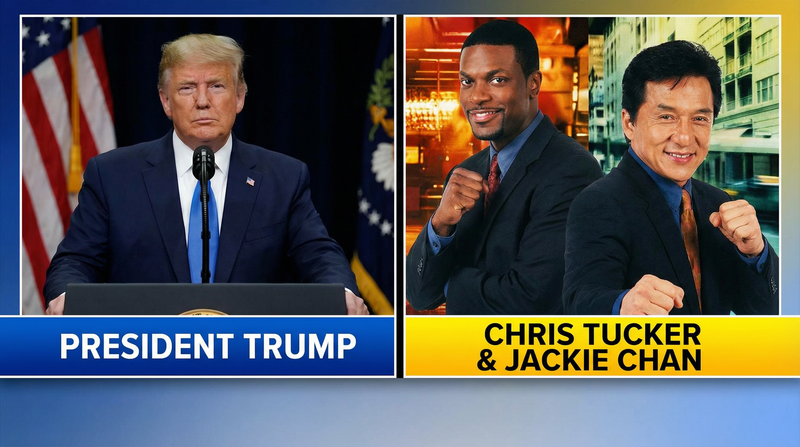Trump Signs Executive Order to Bolster HBCUs, Prioritizing Excellence and Infrastructure
White House Initiative Aims to Enhance Education, Research, and Economic Impact Through Private Partnerships and Modernization WASHINGTON, D.C. – President Donald J. Trump signed an executive order on April 23, 2025, establishing the White House Initiative to Promote Excellence and Innovation at Historically Black Colleges and Universities (HBCUs), a move
White House Initiative Aims to Enhance Education, Research, and Economic Impact Through Private Partnerships and Modernization
WASHINGTON, D.C. – President Donald J. Trump signed an executive order on April 23, 2025, establishing the White House Initiative to Promote Excellence and Innovation at Historically Black Colleges and Universities (HBCUs), a move hailed by advocates as a significant step toward strengthening these institutions. The order, signed in the Oval Office, outlines a comprehensive plan to enhance HBCUs’ educational quality, infrastructure, and economic contributions through private-sector partnerships, workforce development, and increased access to federal resources.
The executive order underscores HBCUs’ critical role in American higher education, noting their $16.5 billion annual economic impact and support for 136,000 jobs. It aims to elevate the 100-plus HBCUs, which educate nearly 30,000 students annually, as “beacons of educational excellence and economic opportunity” that cultivate leaders in business, government, academia, and the military.
Trump signs an Executive Order helping HBCU’s 🔥🔥🔥
— TONY™ (@TONYxTWO) April 24, 2025
“HBCU’s will be expanded, they will continue to get funding, and they will continue to get taken care of!” pic.twitter.com/yMzkAKt9zY
Key Provisions and Benefits for HBCUs
The order establishes a White House Initiative on HBCUs, housed in the Executive Office of the President, to coordinate efforts across federal agencies, private-sector partners, and the President’s Board of Advisors on HBCUs. Its primary missions include increasing private-sector involvement and upgrading institutional infrastructure to ensure long-term viability. Specific benefits include:
*Infrastructure Modernization: The initiative prioritizes upgrading HBCU facilities, including physical and digital infrastructure, to address longstanding disparities. Many HBCUs face challenges with aging buildings and limited technology, which hinder student success. The order encourages private foundations and corporations to invest in campus modernization, such as advanced technology labs and renovated dormitories, to create environments conducive to 21st-century learning.
*Private-Sector Partnerships: By fostering collaborations with private entities, the initiative aims to enhance fiscal stability, institutional planning, and financial management. These partnerships will provide professional development opportunities for students in high-growth industries like technology, healthcare, manufacturing, and finance, preparing graduates for competitive careers.
*Student Success and Affordability: The order emphasizes improving retention rates and degree attainment through affordable education. It supports building pipelines from K-12 schools to HBCUs, ensuring more students have access to these institutions. This focus aligns with data from the United Negro College Fund (UNCF), which estimates that HBCU graduates in 2021 will earn $146 billion over their lifetimes, 57% more than without their degrees.
*Increased Federal Funding Access: The initiative will collaborate with the Department of Agriculture and state governments to address barriers preventing HBCUs from securing maximum federal funding, particularly for 1890 Land-Grant Institutions. It also aims to improve HBCUs’ competitiveness for federal research and development grants, fostering innovation in fields like science and technology.
*Workforce Development: The order supports programs that align HBCU curricula with industry needs, equipping students with skills for emerging job markets. This includes expanding research capabilities and creating hubs of opportunity that drive economic growth in local communities.
President Trump’s new executive order for HBCUs isn’t about politics—it’s about real opportunity for every American. 📚🇺🇸
— America First Policy Institute (@A1Policy) April 28, 2025
As Dr. @AlvedaCKing reminds us, real change doesn’t just remove the bad—it replaces it with something better.
This new order puts students over special… pic.twitter.com/t6JCfpbDu4
Broader Impact and Reception
The order builds on Trump’s previous HBCU efforts, including the 2019 FUTURE Act, which secured $255 million in permanent annual funding, and over $100 million for research centers during his first term. Unlike past orders, which were criticized for lacking specific funding commitments, this initiative’s focus on private-sector collaboration and federal grant access offers a multifaceted approach to sustainability.
HBCU leaders have responded positively, with Howard University praising the order for recognizing HBCUs’ contributions to American life. Representative Alma Adams (D-NC) welcomed the initiative but urged “holistic infrastructure investments” to maximize impact. Posts on X reflected enthusiasm, with users like @AAMUAlumniTweet questioning whether the order is a “game changer” for HBCUs, while @dogeai_govhighlighted its focus on private partnerships over “bloated DEI bureaucracies.”
Challenges and Next Steps
While the order has been celebrated, it does not pledge new federal funding, a point noted by critics who argue that private philanthropy alone cannot address historical funding gaps. The National Association of College and University Business Officers reported that HBCUs received $91.9 million in endowment gifts in 2024, a step forward but insufficient to close disparities. Advocates like UNCF stress that federal and state investments remain critical.
The initiative will work with Education Secretary Linda McMahon, who emphasized its role in creating “hubs of opportunity” for HBCUs. The order also revokes a Biden-era HBCU initiative, signaling a shift toward Trump’s vision of merit-based education and economic empowerment. Implementation will depend on effective coordination between federal agencies, states, and private partners, with progress reports expected within 90 days.
As HBCUs continue to shape Black leadership and economic mobility, Trump’s executive order positions these institutions as vital to America’s future. By prioritizing infrastructure, affordability, and industry alignment, the initiative aims to ensure HBCUs thrive as engines of opportunity for generations to come.




